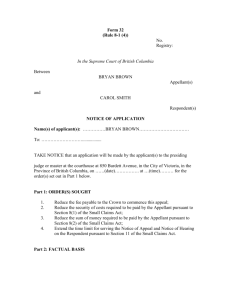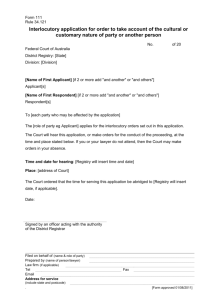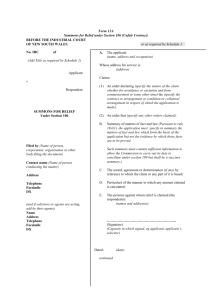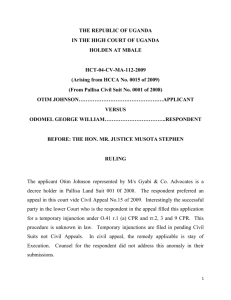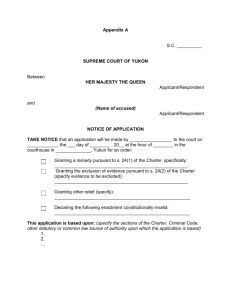hc-family-division-2014-27
advertisement
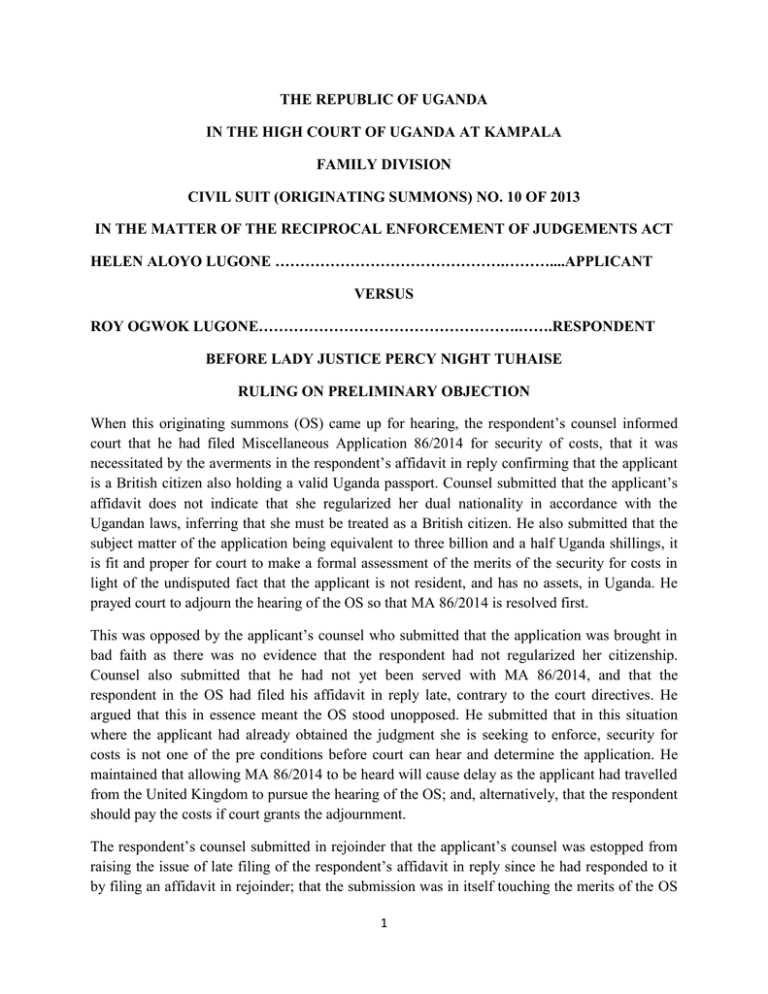
THE REPUBLIC OF UGANDA IN THE HIGH COURT OF UGANDA AT KAMPALA FAMILY DIVISION CIVIL SUIT (ORIGINATING SUMMONS) NO. 10 OF 2013 IN THE MATTER OF THE RECIPROCAL ENFORCEMENT OF JUDGEMENTS ACT HELEN ALOYO LUGONE ……………………………………….………....APPLICANT VERSUS ROY OGWOK LUGONE…………………………………………….…….RESPONDENT BEFORE LADY JUSTICE PERCY NIGHT TUHAISE RULING ON PRELIMINARY OBJECTION When this originating summons (OS) came up for hearing, the respondent’s counsel informed court that he had filed Miscellaneous Application 86/2014 for security of costs, that it was necessitated by the averments in the respondent’s affidavit in reply confirming that the applicant is a British citizen also holding a valid Uganda passport. Counsel submitted that the applicant’s affidavit does not indicate that she regularized her dual nationality in accordance with the Ugandan laws, inferring that she must be treated as a British citizen. He also submitted that the subject matter of the application being equivalent to three billion and a half Uganda shillings, it is fit and proper for court to make a formal assessment of the merits of the security for costs in light of the undisputed fact that the applicant is not resident, and has no assets, in Uganda. He prayed court to adjourn the hearing of the OS so that MA 86/2014 is resolved first. This was opposed by the applicant’s counsel who submitted that the application was brought in bad faith as there was no evidence that the respondent had not regularized her citizenship. Counsel also submitted that he had not yet been served with MA 86/2014, and that the respondent in the OS had filed his affidavit in reply late, contrary to the court directives. He argued that this in essence meant the OS stood unopposed. He submitted that in this situation where the applicant had already obtained the judgment she is seeking to enforce, security for costs is not one of the pre conditions before court can hear and determine the application. He maintained that allowing MA 86/2014 to be heard will cause delay as the applicant had travelled from the United Kingdom to pursue the hearing of the OS; and, alternatively, that the respondent should pay the costs if court grants the adjournment. The respondent’s counsel submitted in rejoinder that the applicant’s counsel was estopped from raising the issue of late filing of the respondent’s affidavit in reply since he had responded to it by filing an affidavit in rejoinder; that the submission was in itself touching the merits of the OS 1 which was yet to be heard; that substantive justice should be dispensed by this court without undue regard to technicalities; and that the OS is a suit to which O. 26 of the Civil Procedure Rules (CPR) applies. I have carefully addressed the application and counsel’s prayer, including the submissions of both counsel and the law applicable. The application for security of costs is not part of the record before me. It is yet to be served on the applicant or to be fixed for hearing before the Registrar of this court. I will not go into the merits of MA 86/2014 since it is not before this court. However, it is inevitable to point out its surrounding circumstances if this court is to make a ruling as to whether the OS before me requires a prior hearing of an application for security of costs before it is determined. The purpose of security of costs as provided under Order 26 rule 1 of the CPR is to secure a defendant who may incur costs to defend a suit instituted by a plaintiff who cannot pay his/her costs. The main considerations in such applications are whether the applicant is being put to undue expense of defending a frivolous and vexatious action, whether the defendant has a good defence to the suit, and whether such a defence is likely to succeed. Some of the reasons which might prompt a defendant to apply for security for costs include where the plaintiff is resident abroad and does not have substantial property within jurisdiction of court. See Anthony Namboro V Henry Kaala [1975] HCB 35. The respondent’s counsel relies on his contentions that the applicant has not regularized her Ugandan dual citizenship, is not resident in Uganda, and has no assets in Uganda to justify the application for security of costs. This is challenged by the applicant’s counsel who submitted that there is no evidence of the applicant not having regularized her citizenship. The merits or otherwise of the contentions are not for this court to determine at this stage, but for the court that will hear MA 86/2014. The point relevant for this court is that the respondent’s counsel’s contentions are based on the revelations apparent on the court record in connection with the OS, though they are yet to be determined on the merits. Counsel for the applicant submitted that security for costs is not one of the pre conditions before court under the Act since the applicant had already obtained the judgment she is seeking to enforce. I will briefly address the circumstances surrounding the application before me without necessarily analyzing its merits, to enable an appreciation of whether or not an adjournment would be called for in this case. Section 2 of the Reciprocal Enforcement of Judgments Act, cap 21 requires court, on application by the judgment creditor, to order judgments obtained in a superior court in the United Kingdom (UK) or the Republic of Ireland to be registered in the court. Section 2(2) of the same Act spells out situations where no judgment shall be ordered to be registered. It is thus clear from the Act that the order for registration of the judgment is not automatic. It may be denied where any of the situations spelt out under section 2(2)(a) to (f) of 2 the Act prevail. The existence or non existence of such situations can only be proved by evidence adduced during the hearing of the application and no speculations should be made at this stage. The record, on the face of it, shows that the respondent filed his affidavit in reply to which the applicant filed an affidavit in rejoinder. This was after this court directed the summons to be issued to the respondent, in accordance with rule 2 of the Reciprocal Enforcement of Judgments Rules SI 21 – 1, following its ex parte presentation by the applicant’s counsel. I will not go into the questions raised by both counsel in their submissions as to whether the application is defended or not. It would tantamount to prematurely delving into the merits of the OS which is yet to be heard. I can only state that the filing of the affidavit in reply on the face of the record shows an apparent desire to be heard on the part of the respondent after summons was issued to him. This therefore means that the OS will be heard inter partes, without prejudice to any points of law or technicalities that may be raised at the hearing. Even if it was heard ex parte, the burden on the applicant to prove his/her case to the required standards remains, whether or not it is heard ex parte. The application before me sets out three questions for determination. Question number 3 reads:“Whether the respondent should pay the costs of this application.” This infers that the issue of costs is one of the questions to be determined. Section 2(5) of the Reciprocal Enforcement of Judgments Act provides that the plaintiff shall not be entitled to recover any costs of the action unless the applicant has previously been refused to register the judgment “or unless the court otherwise orders” (emphasis mine). This, in my opinion, implies that the issue of costs, which is a question for determination in the main application, will be in the discretion of court. In view of section 27(2) of the Civil Procedure Act which lays out the general principle that costs follow the event, this infers that the applicant could, if this court exercises the discretion in the respondent’s favour, be required to pay costs to the respondent if leave to register the judgment is not granted. These, in my opinion, could be the envisaged costs for which the respondent is seeking security. Order 26 of the CPR allows discretion to court to order a plaintiff in any suit to give security for costs incurred by a defendant. Black’s Law Dictionary 9th edition at page 1572 defines a suit as any proceeding by a party or parties against another in a court of law. The Civil Procedure Act defines a suit to mean all proceedings commenced in any manner prescribed. This, in my opinion, would include proceedings commenced through an OS, like the one pending before me. In that respect, it would be relevant to have MA 86/2014 heard and determined before the hearing of the OS commences, since costs may not be out of question in the determination of the OS, regardless of where they fall. 3 Thus, for reasons given, I grant the respondent’s prayer to adjourn the hearing of the application before me, pending the determination of MA 86/2014 by the Registrar of this court. The costs of the adjournment will be in the cause of the main application (OS). Percy Night Tuhaise Judge 29/04/2014. 4

